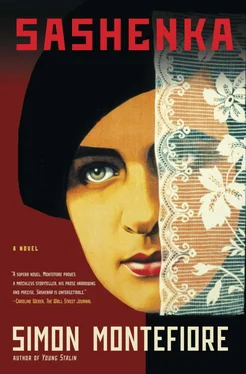Sometimes Ariadna struggled to breathe and began to panic. Sweat poured off her, soaking the sheets, and she clawed the bed. Then Sashenka would stand up and take her hand. All of a sudden, there was so much she wanted to say to her mother: she wanted to love her, wanted to be loved by her. Was it too late?
“Mama, I’m here with you, it’s me, Sashenka! I love you, Mama!” Did she love her? She was not sure, but her voice was saying these things.
Dr. Gemp came again. He pulled Zeitlin and Sashenka aside.
“Don’t raise your hopes, Samuil,” said the doctor.
“But she wakes up sometimes! She talks…,” said Zeitlin.
“The wound’s infected and the infection has spread.”
“She could recover, she could…,” insisted Sashenka.
“Perhaps, mademoiselle,” replied Dr. Gemp smoothly, as a maid handed him his black cape and fedora. “Perhaps in the land of miracles.”
“Would you like me to read something to you?” Ariadna heard her daughter ask the next morning.
“No need,” she replied, “because I can come and read it myself.” Another Ariadna rose up from the Ariadna on the bed and hovered over Sashenka’s shoulder. She looked down and barely recognized the waxy creature with a dressing on her chest, breathing fast like a sick dog. Her hair was lank and greasy but she did not demand that Luda bring the curling tongs—so she must be dying. Ariadna wondered if she had always been cursed by the Evil Eye or infested by a dybbuk, or whether she had brought all her troubles upon herself.
She spun away from reality into wondrous dreams. She flew gracefully around the room. What visions she had! She and Samuil were together in a garden with tinkling fountains and luscious peaches. Were they in the Garden of Eden? No, the forests were slim silver birches: these were Zeitlin’s forests, soon to be the butts of rifles in the dead hands of Russian solders. The trees became ballerinas in tutus, then stark naked.
She opened her eyes. She was in her room again. Sashenka was sleeping on the divan. It was night. The room was softly lit by a lamp, not electric light. Samuil and two old Jews, a man and a woman, were talking quietly.
“I’ve lost myself, Rabbi,” said Samuil in Yiddish. “I no longer know who I am. I’m not a Jew, not a Russian. I have long ago ceased to be a good husband or a good father. What should I do? Should I wear phylacteries and pray as a religious Jew, or should I become a socialist? I thought I had my life in order and now…”
“You’re just a man, Samuil,” answered the bearded sage.
Ariadna knew that voice: it was her father. What a fine voice, so deep and kind. Would he curse Samuil and call him a heathen? she wondered.
“You’ve done bad things and good things. Like all of us,” her father said.
“So what should I do?”
“Do good. Do nothing bad.”
“It sounds simple.”
“It’s very hard but it is a great thing. Don’t harm yourself or others. Love your family. Ask for God’s mercy.”
“But I’m not even sure I believe in him.”
“You do. Or you would not be asking these questions. All of us sin. The body is for sinning in this world. Without the choice, goodness would be meaningless. The soul is the bridge between this world and the next. But everything is God’s world. Even for you, even for poor, darling Finkel, God’s mercy is there, waiting. That is all you need to understand.”
Who on earth was Finkel? Ariadna asked herself. Of course, it was her real name. Her father and her bewigged mother seemed to her at one moment like laughable cartoons; at another, they were as sacred as priests in the Temple of Solomon.
“And Ariadna?” Samuil asked.
“A suicide.” Her father shook his head. Her mother started to weep.
“I blame myself,” said Samuil.
“You did more for her than us, more than anyone,” said her father. “We failed her; she failed us. But we love her. God loves her.”
Ariadna was moved; she felt fondness for her parents, but not love. She no longer loved anyone. These were characters from her life, familiar faces and voices, but she loved none of them.
She was light as a goose feather, a draft from a window blew her this way and that. Her body lay there, croaking and wheezing. She was interested in this, but not involved in its mechanical functions. Dr. Gemp came into the room and threw off his cape like a Spanish bullfighter. She felt her forehead being dabbed; her dressing changed; morphine injected; her lips wetted with warm, sugary tea. Her belly ached; bowels groaned; the congested fist in her chest throbbed around a single bullet that she herself had placed there. This thing on the bed—the body she recognized as hers—was no more important than a laddered pair of stockings, a good pair, but an object that could be thrown away without a thought.
Her father was praying aloud, reading from the Psalms, singing in a deep chant that filled her with disinterested joy. It was the voice of a nightingale outside in the garden. But when she looked at his face, he was young, his beard a reddish brown, eyes strong and bright. Her mother was there too, full of life, even younger. She did not wear a wig but her own long blond hair in braids, and a girl’s dress. And her grandparents too, all much younger than she. There was her husband as a teenager. Sashenka as a little girl. They could now be her sisters and brothers.
The rabbi’s chanting carried her to Turbin three decades earlier. Her father and the beadle were walking out of the studyhouse; her mother was cooking dumplings and noodles laced with saffron, cinnamon and cloves. Ariadna was in trouble even then: she had refused to marry the son of the Mogilevsky rabbi, had been seen talking to one of the Litvak lads who did not even wear ringlets—and she had met a Russian officer in the woods near the barracks. She adored that uniform, the gold buttons, the boots, the shoulder boards. No one knew she had kissed not only the Litvak boy but also the young Russian, sipping cognac that made her glow, their hands all over her, her skin fluttering under their caresses. How that officer must have boasted and laughed to his friends in the officers’ mess: “You’ll never guess what I found in the woods today. A lovely Jewess fresh as the dew…”
I was too beautiful for the rabbi’s court in Turbin, she told herself. I was a peacock in a stable. And now she was happily going back to Turbin. Or at least passing through there, on the way to somewhere else. What was written for her in the Book of Life?
But when Ariadna flew back to that familiar bedroom filled with family and re-entered her body, she realized that it was no longer her bedroom, Sashenka was no longer her daughter, Miriam no longer her mother—and she herself was no longer Ariadna Finkel Barmakid, Baroness Zeitlin. She became something else, and she was filled with joy.
Sashenka was the first to notice. “Papa,” she said, “look! Mama’s smiling.”
“She’s gone,” said Miriam, taking her daughter’s hand.
“Woe is to outlive your own child,” said the rabbi quietly and then he started to pray for his daughter. Sashenka felt that she had made some peace with her mother, but her father, who had been napping on the divan, awoke and threw himself onto the body, weeping.
Uncle Gideon, now writing for Gorky’s New Life newspaper, flirting with both the Mensheviks and the Bolsheviks, was also there, waiting in the corridor, and he rushed into the room and lifted Zeitlin off Ariadna’s body. He was immensely strong and he carried the baron away and sat him in a chair outside.
The doctor sent them all out. He closed Ariadna’s mouth and her eyes and then called them back. “Come and see her now,” he instructed.
Читать дальше












